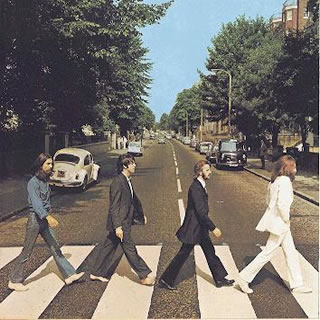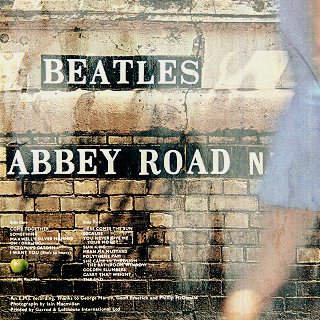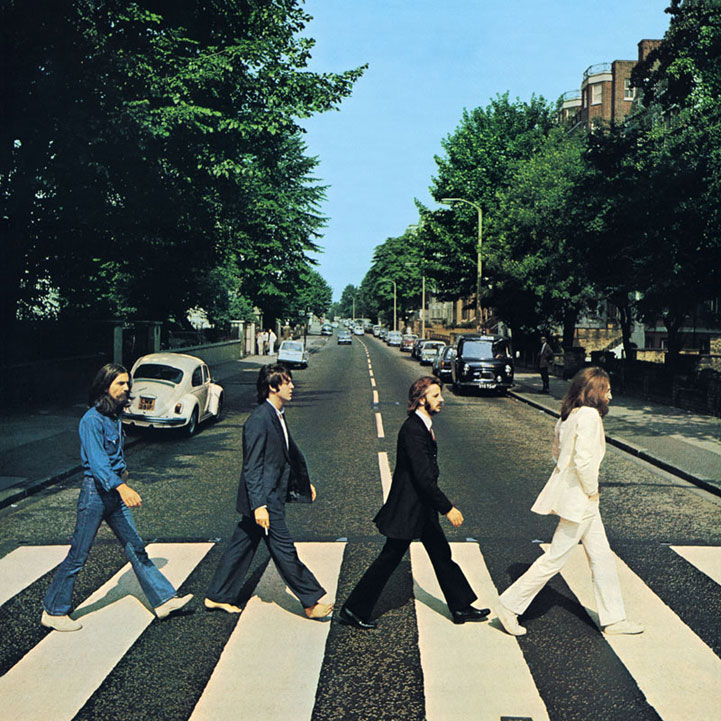|
Previous / Next
UK album |
 |
Abbey Road
First released: 1969, September 26 Buy
|
| Covers |
|---|



|
| Additional information | ||||||||||
|---|---|---|---|---|---|---|---|---|---|---|
Songs recording date and information:
The Beatles twelfth official album release, but the LAST that was actually recorded by them. The album was of course, named after the London road in St. John's Wood that houses the E.M.I. studios (although, at one time it was going to be titled, "Everest"). And because of the eventual success of the album, the studios were re-named as "Abbey Road Studios". The cover photograph was taken Friday 8th August 1969 by Iain Macmillan at 10 o'clock in the morning. For these quick snaps a British Bobby held up the traffic for 10 minutes as six pictures were taken (in two of which Paul wore his sandals !). Along with Sgt. Peppers, once again The Beatles managed to create something so unique that it has been imitated many times. In America "Abbey Road" won a Grammy for "Best Engineered Non-Classical Recording". Also recorded during the Abbey Road sessions, Considering Abbey Road as it should be considered - the last Beatles album, even though it was the penultimate release - it is an astonishing piece of work, quite possibly the best album the group made. Astonishing because the animosity within the group was largely submerged during the sessions and was not allowed to interfere with what, in the end, the Beatles were all about: music. All four Beatles shone on Abbey Road : John's compositions and vocal work, Paul's supreme musical craft in the long medley, George's skilful musicianship and Ringo's truly excellent drumming throughout. Even if, as the studio engineers have testified, the four Beatles really only came together for the recording of the basic tracks, with overdubs being applied in a mostly solo fashion, somehow the sum of those four parts did make a whole unit, which was the vital ingredient missing from The Beatles , recorded in much the same way. " Abbey Road was a kind of Sgt. Pepper mark two," says George Martin, who has publicly stated his preference for the former. "It was innovatory but in a controlled way, unlike The Beatles and Let It Be which were a little beyond control. One side of Abbey Road was very much John - let's rock a little, let it all hang out. The other side was Paul - perhaps even symphonic. The segues were my idea, to have a continuous piece of music. Wherever possible we would design a song that way." But how did the Beatles themselves measure the album? Alan Parsons recalls, "When the album was finished we were listening to a playback and Tony Hicks of the Hollies came in and joined us, hearing the LP from the start to finish. He said to Paul 'I think this album is every bit as good as Pepper ' but Paul disagreed with him. 'No, I don't think it's as good as Pepper , but I do like George's song, I think that's the best. Something is the best song George has ever written.'" Perhaps as expected, John Lennon later dismissed the entire album, and was especially condemnatory about the long medley. "Even before they began the album I remember John saying that he wanted all of his songs on one side and all of Paul's on the other," recalls Phil McDonald. Although the bad feelings were largely submerged during the sessions, there were some heavy moments. "You didn't want to get involved," says Phil McDonald, "but people would be walking out, banging instruments down, not turning up on time and keeping others waiting three or four hours, then blaming each other for not having rehearsed or not having played their bit right. It was very distressing." One member of the studio personnel closely involved with the LP, who prefers to remain anonymous, recalls a very bitter row between John Lennon and George Harrison during the time that Yoko was attending sessions in her double-bed. "She got up and took a digestive biscuit off the top of George's Leslie speaker cabinet. George saw this from the control room windown and got into a big argument with John. The biscuit thing was soon forgotten; it seemed to me that they just wanted an excuse to argue, to air their pent-up resentments." In naming their album Abbey Road , the Beatles bestowed instant world fame upon the studio in which they had recorded almost all of their output, and since the day of the LP release the studio building has taken on an almost tangible aura of magic, and - like the zebra crossing outside - it is vistied daily , still, by tourists from all over the world. Ken Townsend, now general manager of the complex which actually calls itself Abbey Road Studios these days (having changed - because of the Beatles' LP connetion - from plain old EMI Studios in the 1970s) was recently travelling on a train in deepest Japan. "Some 16- or 17-year-old girls came up to us and tried to practise their English language. They asked us for our business cards. When I handed mine over they instantly said 'Ah, Abbey Road, Beatles!'. Thanks to the Beatles, Abbey Road is a worldwide, household name." But it was nearly so different. "At one point the album was going to be titled 'Everest', after the brand of cigarettes I used to smoke," recalls Geoff Emerick. "Paul often glanced at the packet of cigarettes because it had a silhouette picture of Mount Everest. He liked the idea." John Kurlander recalls, "It was around July, when it was very hot outside, that someone mentioned the possibility of the four of them taking a private plane over the foothills of Mount Everest to shoot the cover photograph. But as they became more enthusiastic to finish the LP someone - I don't remember whom - suggested 'Look, I can't be bother to schlep all the way over to the Himalatas for a cover, why don't we just go outside, take the photo there, call the LP Abbey Road and have done with it?' That's my memory of why it became Abbey Road : because they couldn't be bothered to go to Tibet and get cold!" - Mark Lewishon "The Beatles Recording Sessions"
|

